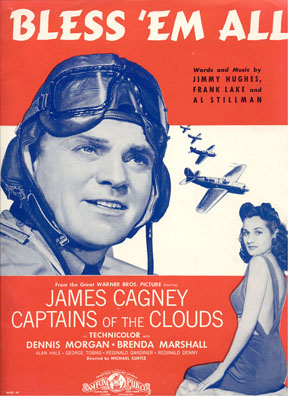The Songs They Sang: No Lilies, no Violets
Bless 'em all, Bless 'em all,
The long and the short and the
tall....
Sent us off solo and left us to die…
 Hollywood or no, it does appear to have
been popular in
the Army Air Force and the RAF during WWII. But like many
of the
songs they sang, it wasn't exclusive to the flying
services. One
source describes it as the unofficial anthem of the US Marines,
and the
second line became the title of a 1961 movie about British
soldiers in
Burma during the war.
Hollywood or no, it does appear to have
been popular in
the Army Air Force and the RAF during WWII. But like many
of the
songs they sang, it wasn't exclusive to the flying
services. One
source describes it as the unofficial anthem of the US Marines,
and the
second line became the title of a 1961 movie about British
soldiers in
Burma during the war.
Most of the songs of the wartime pilots were adapted from other
sources, from popular tunes to old standards like "The Battle
Hymn of
the Republic." It seems inevitable that "Bless 'Em All" is
just a
different set of lyrics for an old music hall tune, sea chantey,
or
fraternity song.
But this isn't the case. The song is a mix of music hall ditty
and
barrack ballad, written by a sailor. But since the sailor
was a
member of the British Royal Naval Air Service (RNAS), we can
consider
that aviators have the strongest claim.
So cheer up my lads, bless them all!
It came from the fertile mind of Welsh
songwriter Fred
Godfrey (no relation to Arthur). Born Llewellyn
Williams in
1880, he'd come to London at the turn of the century. The
recording industry was booming, and his songs became immediate
hits. When World War One began, he switched to patriotic
and
morale-boosting songs with the same level of success.
Like Elvis Presley forty years later, being popular didn't stop
him
from being drafted. He was 36 when he was conscripted into
the
RNAS. He wasn't a pilot...he was just one more sailor
handling
dirigible mooring lines.
By all reports, he wasn't very suited to the military. But
the
men loved the songs he banged out on the canteen piano, both his
own
old standbys and the new ones written to go with his naval
life.
Shortly after the RNAS was absorbed into the new Royal Air
Force, it
was decided that Airman Fred Godfrey helped the war effort more
by
writing songs in London than by tugging on blimp cables.
Each lad is happy to take what he gets....
Curiously, when Godfrey got back to London, he didn't publish the new song. Strange indeed, when songwriting was his entire livelihood, and when one sees how popular "Bless 'Em All" became during the next war. Why not publish it, and sell it to one of the recording artists clamoring for his songs, and rake in the dough?
We don't really know. But we get a hint from how the song eventually did get released. As part of the morale-building efforts at the start of WWII, two staff writers at a London publisher were put to work "cleaning up" popular service songs for public consumption. And "Bless 'Em All," recorded by film star George Formby, was their biggest hit.
Written for his 'messmates' hanging around the canteen piano, it's quite possible that Godfrey's original version of "Bless 'Em All' was too raunchy for public consumption. But what were the original lyrics? How were they so fundamentally dirty that he didn't even bother to clean it up himself and publish it?
Samuel Hynes' book about his time as a Marine pilot during WWII, Flights of Passage, confirmed my suspicion. He recalls singing it with his fellow pilots in various bars and clubs. But they didn't use the word, "Bless." They used another word, one much more popular in the United States Marine Corps. The one Ralphie in the movie "A Christmas Story" describes as, "The queen mother of dirty words... the 'F-dash-dash-dash' word."
Bless all the corporals, the fat-headed ones...
Yep. Sounds about right.
But there's a sad note to the realization. Most of the young men singing that song, in the pilot's lounges, mess halls, or ready rooms, were probably only a few years beyond where their mothers would wash their mouths out with soap for such talk. They were probably drinking beer and whiskey, not long after their fathers would have 'tanned their hides' for such transgressions.
They were trained to fly and fight in Uncle Sam's finest aircraft, when they had barely given up their bicycles. The song helped celebrate their first taste of liberty, the initial tantalizing scent of the forbidden pleasures of manhood.
And, for too many of them, the next step was sacrificing their lives for their country's freedom.
So think not unkindly on the blue language of our youthful fathers and grandfathers. Remember the song as "Bless 'Em All" with just a private smile, and drink a toast to the men who fought in the skies by day and made the rafters ring by night.
You're in for one heck of a fall,
No lilies or violets
For dead fighter pilots,
So cheer up my lads, bless 'em all!
For more Information:
- George
Formby singing, "Bless
'em
All"
- A web page about Fred
Godfrey, including more background into the song.
- It's included in both Oscar Brand's "Wild Blue Yonder"
LP/CD
(Order the 2-CD "Military Songbook) and Dick
Jonas
has a version as well.
Questions? Email Ron Wanttaja .

